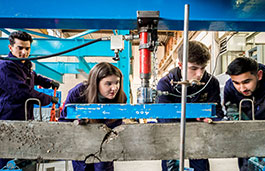Search
Architectural Technology BSc (Hons)
Study level: Undergraduate
This course aims to prepare you to play a pivotal role in the construction industry – one of the world’s largest and most influential industries – as an architectural or building technologist.
Course option
Year of entry
Location
Coventry University (Coventry)
Study mode
Full-time
Sandwich
Duration
3 years full-time
4 years full-time (study abroad or work placement)
UCAS codes
K130
Start date
September 2025
Course overview
Playing a pivotal role within the construction process as lead designers or complementing other chartered professionals in the built environment, this course aims to prepare you in seeking future employment in architectural practice, city and urban planning.
- You will learn the practices behind interior design, builders and contractors, and oil and gas developments, together with many other areas and specialisms.
- You will learn from current fully qualified and experienced staff who have a high level of design and technical experience in the construction industry, some of whom are still involved in research projects (staff are subject to change).
Rated Gold Overall
Teaching Excellence Framework (TEF) 20235 QS Stars for Teaching and Facilities
QS Stars University RatingsTop 5 Student City in England (Coventry)
QS Best Student Cities Index 2026Why you should study this course
- Collaborative links with universities around the world, including Spain, USA, Denmark, Italy and France, offer you the chance to spend part of your studies abroad2 (collaborations are subject to change).
- Studios and laboratories4 equipped with the latest versions of CAD software including 2D, 3D and visualisation software, building information management software and building performance analysis programmes.
- The opportunity to take part in events where you could meet members of the local design and building community and attend professional development meetings held by the professional institutions on campus2 (subject to availability).
- The common first year makes it possible to further explore your interests and transfer to one of the following courses; Architectural Design and Technology MSci, Building Surveying BSc (Hons), Construction Project Management BSc (Hons), Quantity Surveying and Commercial Management BSc (Hons) or Real Estate and Property Management BSc (Hons), subject to meeting the progression requirements.
What you'll study
We regularly review our course content, to make it relevant and current for the benefit of our students. For these reasons, course modules may be updated.
How you'll learn
Previous students have experienced a vast amount of their architectural education by visiting and experiencing architecture in its context, organising site visits to existing buildings and current construction sites at home and abroad2.
Teaching contact hours
As a full-time undergraduate student, you will study modules totalling 120 credits each academic year. A typical 20 credit module requires a total of 200 hours study. This is made up of teaching contact hours, guided and independent study.
Teaching hours:
Teaching hours vary each semester, year of study and due to module selection. During your first year you can expect 15-18 teaching hours each week. You will also have the option to attend optional sessions including time with a progress coach or to meet with staff for advice and feedback. As you progress through your studies, teaching hours may reduce.
Guided and independent study:
Throughout your studies, you will be expected to spend time in guided and independent study to make up the required study hours per module. You'll be digging deeper into topics, review what you've learnt and complete assignments. This can be completed around your personal commitments. As you progress through your studies, you'll spend more time in independent study.
Online learning:
As an innovative university, we use different teaching methods including online tools and emerging technologies. So, some of your teaching hours and assessments may be delivered online.
Assessment
This course will be assessed using a variety of methods which will vary depending upon the module.
Assessment methods may include:
- design portfolio
- modelling
- coursework
- essays
- reports
- projects
- phase tests
- group work
- presentations
- laboratories
- posters.
The Coventry University Group assessment strategy ensures that our courses are fairly assessed and allows us to monitor student progression towards achieving the intended learning outcomes.
International experience opportunities
Construction is a global industry with the demand for building professionals overseas predicted to rise dramatically. In a 2019 report, the United Nations identified nine countries which will account for half the world’s population growth between now and 2050: India, Nigeria, Pakistan, the Democratic Republic of Congo, Ethiopia, Tanzania, the US, Indonesia and Uganda.
The content of the course continuously refers to the international context in which architecture takes place, which aims to give an international perspective to your studies and future career. For example, we draw on case studies such as the ancient and modern architecture of Rome or Gaudi in Barcelona.
A mandatory part of your course is the international field trip which gives you the chance to look at architecture and building design outside the UK . Previous destinations have included Rome in Italy and Barcelona in Spain and there is no extra cost to you for this trip. The field trip takes place in your final year.
If you opt for a sandwich year2, you can spend time studying abroad; we currently have links with other universities in Malaysia, Oman, Canada, France, Germany, Spain, Italy, Poland and The Netherlands, which provide opportunities for student exchanges, workshops and projects.
Please note that all international experience opportunities may be subject to additional costs, competitive application, availability, and meeting applicable visa and travel requirements, and are therefore not guaranteed.
Entry requirements
Typical entry requirements:
Not got the required grades? We offer this degree with an integrated foundation year.
Fees and funding
| Student | Full-time | Part-time |
|---|---|---|
| UK, Ireland*, Channel Islands or Isle of Man | £9,535 per year | Not available |
| EU | £9,535 per year with EU Support Bursary** £19,850 per year without EU Support Bursary** |
Not available |
| International | £19,850 per year | Not available |
If you choose to study this course with a professional placement2 or study abroad year, you will need to pay a tuition fee3 to cover your academic support throughout your placement year. Students commencing their professional placement in the academic year 2027/28 will pay £1,500 if they are paying UK fees, or £1,800 if they are paying international fees.
For advice and guidance on tuition fees and student loans visit our Undergraduate Finance page and see The University’s Tuition Fee and Refund Terms and Conditions.
The University will charge the tuition fees that are stated in the above table for the first Academic Year of study. The University will review tuition fees each year. For UK (home) students, if Parliament permits an increase in tuition fees, the university may increase fees for each subsequent year of study in line with any such changes. Note that any increase is expected to be in line with inflation.
If you choose to study this course with a professional placement, the University will charge the tuition fees stated above for those on a placement during Academic Year 2027/28. The University will review professional placement tuition fees each year. For UK (home) students, the University may increase fees for each subsequent year of study, but such that it will be no more than 5% above inflation.
For international students, we may increase fees each year, but such increases will be no more than 5% above inflation. If you defer your course start date or have to extend your studies beyond the normal duration of the course (e.g. to repeat a year or resit examinations) the University reserves the right to charge you fees at a higher rate and/or in accordance with any legislative changes during the additional period of study.
We offer a range of International scholarships to students all over the world. For more information, visit our International Scholarships page.
Tuition fees cover the cost of your teaching, assessments, facilities and support services. There may be additional costs not covered by this fee such as accommodation and living costs, recommended reading books, stationery, printing and re-assessments should you need them. Find out what's included in your tuition costs.
The following are additional costs not included in the tuition fees:
- Any optional overseas field trips or visits: £400+ per trip.
- Any costs associated with securing, attending or completing a placement (whether in the UK or abroad).
*Irish student fees
The rights of Irish residents to study in the UK are preserved under the Common Travel Area arrangement. If you are an Irish student and meet the residency criteria, you can study in England, pay the same level of tuition fees as English students and utilise the Tuition Fee Loan.
**EU Support Bursary
Following the UK's exit from the European Union, we are offering financial support to all eligible EU students who wish to study an undergraduate or a postgraduate degree with us full-time. This bursary will be used to offset the cost of your tuition fees to bring them in line with that of UK students. Students studying a degree with a foundation year with us are not eligible for the bursary.
Facilities
Your studies will be centred in high-specification learning environments that benefit from extensive social learning facilities, well-appointed laboratories, industry-standard equipment, lecturing facilities and classrooms, facilitating our innovative teaching methods across a diverse suite of courses.
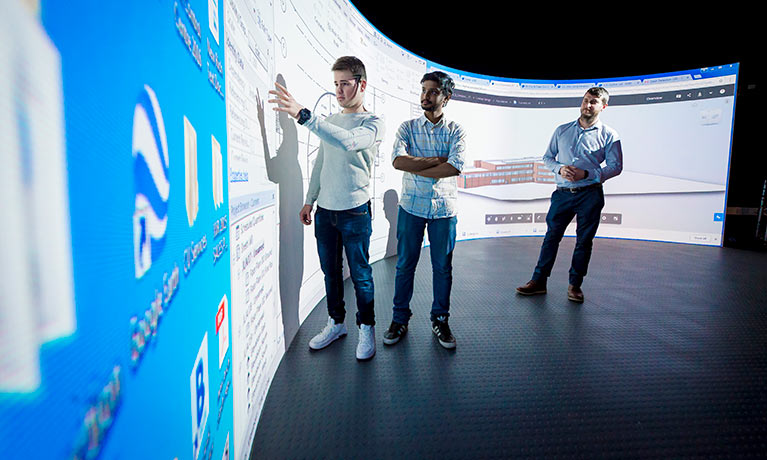
Simulation Centre
You will have access to our Simulation Centre, which incorporates best practice building information modelling (BIM). Using a 3D model, the centre is designed so that you can view and walk through your project to add value, realise efficiencies and ensure every member of the construction team understands what is required of them and when.
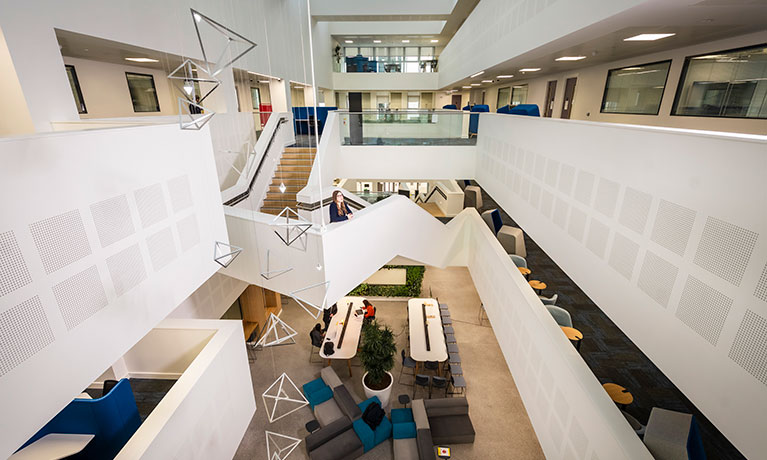
Informal study areas
Our open access spaces provide students with informal computer access to all the specialist software required for their studies at any time. There are bookable spaces where students can meet with academics or work in small groups.
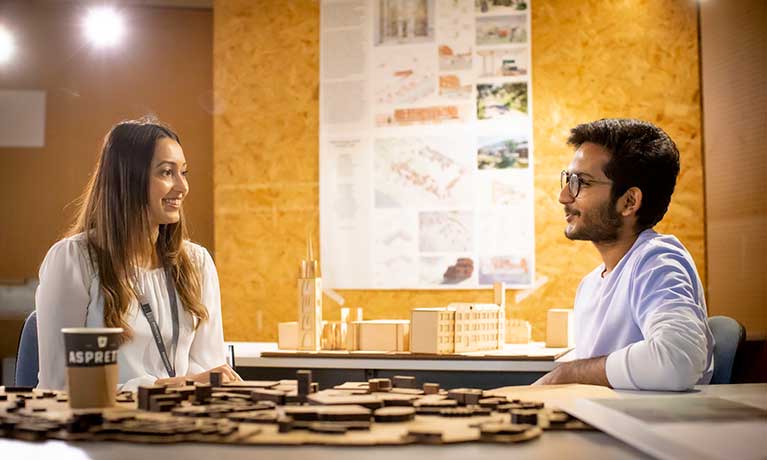
Architectural Studio
The multi-functional Architectural Technology Studio space acts both as a teaching and tutorial room. It houses 40 high spec computers which include Revit, Sketchup and AutoCAD. An informal area is available for group discussions, tutorials and making models.
Facilities are subject to availability. Access to some facilities (including some teaching and learning spaces) may vary from those advertised and/or may have reduced availability or restrictions where the university is following public authority guidance, decisions or orders.
Careers and opportunities
Upon successful completion of the course, you can expect to have knowledge of:
- building technology and construction processes
- management processes and systems associated with construction
- building science with respect to materials, structure, services and internal environment
- the legal and regulatory framework within which buildings are constructed
- economics of construction and the design processes used in construction
- current innovations relating to the construction of buildings, procurement and contract administration procedures and how quality is achieved in construction processes and products
- health and safety in building design and construction.
Upon successful completion of the course, you should be able to:
- analyse data and information sources in construction
- apply techniques used for the analysis and surveying of existing buildings
- apply CAD, manual drawing techniques and other tools to construction design
- apply technical data to specification and production information
- create and present design proposals
- identify the aims and objectives of research
- analyse, interpolate and present information
- analyse and solve construction problems of a technical and managerial nature
- reflect on the interdisciplinary and team working nature of the construction industry to undertake and manage construction design and the construction process
- undertake full-measured, dilapidation and condition surveys
- write different types of property survey reports.
Our Talent Team4 will help you in searching for work experience while you study and employment on graduation. Professional placements could significantly enhance your employability and many of our previous students have found their first graduate job through the organisation they worked for on placement2.
Where our graduates work
Previous graduates have found employment with all levels of companies at national level, such as HOK and local companies such as IDP Partnership and Corstorphine and Wright, with other graduates finding positions all over the world.
Further study
- Construction Management with BIM MSc
- Construction Project and Cost Management MSc
- Sustainability and Environmental Management MSc
You may be entitled to an alumni discount on your fees if you decide to extend your time with us by progressing from undergraduate to postgraduate study.

Discover Phoenix+
Phoenix+ brings you together with other students to learn, experience and develop essential knowledge and skills. Whatever destination you choose, it's about preparing you for life after university.
Learn more about Phoenix+How to apply
You may also like
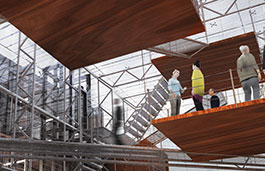
Architecture BSc (Hons)
